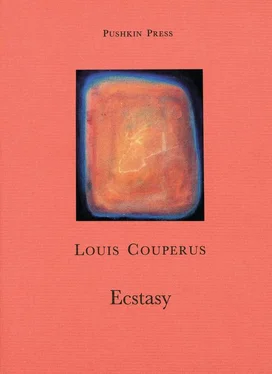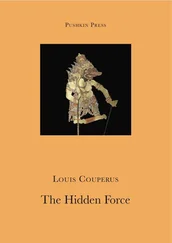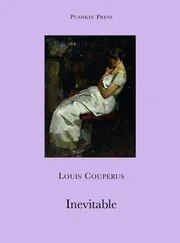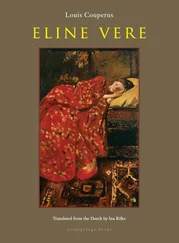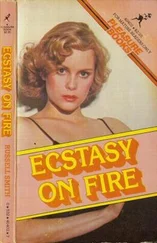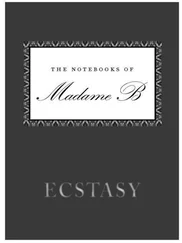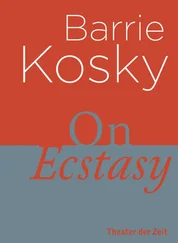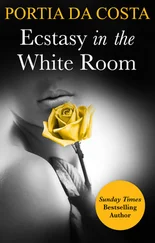“Jules!”
He looked up vacantly. He smiled now, as if awakened from a dream; he rose, went to her, to Cecile. She stood in the doorway; she had remained standing there while he played; it had seemed to her that he was playing a part of herself.
“What were you playing, Jules?” she asked.
He was quite awake now, and distressed, fearing he must have made a terrible noise in the house …
“I don’t know, Auntie,” he said.
She hugged him, suddenly, violently, in gratitude … To him she owed It, the great Mystery, since the day when he had broken out in anger against her …
“Oh, for that which cannot be told, because words are so few, always the same, varying combinations of a few letters and sounds; oh, for that which cannot be thought of in the narrow limits of comprehension; that which at best can only be groped for with the antennae of the soul; essence of the essences of the ultimate elements of our being …”
She wrote no more, she knew no more: why write that she had no words, and still seek them?
She was waiting for him, and she looked out of the open window to see if he came. She remained looking a long time; then she felt that he would come immediately, and so he did; she saw him approaching along the Scheveningen Road; he pushed open the iron gate of the villa, and smiled to her as he raised his hat in greeting.
“Wait!” she cried. “Stay where you are!”
She ran down the steps, into the garden, where he stood. She came towards him, beaming with happiness, and so lovely, so delicately frail: her blonde head so seemly in the fresh green of May; her figure – a young girl’s – in the palest grey gown, with black velvet ribbon, and silver lace here and there.
“I am glad you have come. You have not been to see me for so long!” she said, giving her hand.
He did not answer at once.
“Let us sit in the garden, the weather is so fine.”
They walked into the garden, by the mesh of the garden paths, the jasmine vines starring white as they passed. In an adjoining villa a piano was playing; the sounds came to them of Rubinstein’s Romance in E .
“Listen!” said Cecile, starting up. “What is that?”
“What?” he asked.
“What they are playing.”
“Something of Rubinstein’s, I believe,” he replied.
“Rubinstein … ?” she repeated, emptily. “Yes …”
And she relapsed into the wealth of memories of … what? Once before, in this way, she had walked along these same paths, past these jasmine vines, so long, so long ago; had walked with him, with him … Why? Was the past repeating itself after centuries … ?
“It is three weeks since you came to see me,” she said, simply, recovering herself.
“Forgive me,” he replied.
“What was the reason?”
He hesitated, seeking an excuse.
“I don’t know,” he answered, softly. “You forgive me, do you not? One day it was this, another day that. And then … I don’t know. Many reasons together. It is not good that I should see you often. Not good for you, nor for me.”
“Begin with the second. Why isn’t it good for you?”
“No, let us begin with the first: with what concerns you. People …”
“People?”
“People are talking about us. I am looked upon as an irretrievable rake. I will not have your name linked profanely with mine.”
“And is it?”
“Yes …”
She smiled.
“I do not mind.”
“But you must mind; if not for your own sake …”
He stopped. She knew he was thinking of her boys; she shrugged her shoulders.
“And now, why is it not good for you?”
“One should not be happy too often.”
“What a sophism! Why not?”
“I do not know; but I feel I am right. It spoils one; it blunts the appetite.”
“Are you happy here, then?”
He smiled, and nodded yes. They were silent a long time. They were sitting at the end of the garden, upon a seat that stood in a semi-circle of rhododendrons in flower; the great blossoms of purple satin shut them in with a high wall of closely clustered bouquets, rising from the paths and overtopping their heads; clambering roses flung their incense before them. They both sat still, happy together, happy in the sympathy of their atmospheres mingling together; yet in their happiness there was the invincible melancholy which is an integral part of all life, even in happiness.
“I do not know how I am to tell you,” he resumed; “but suppose I were to see you every day, every moment that I thought of you … That would not do. For then I should become so refined, so subtle, that from pure happiness I should not be able to live; my other being would receive nothing, and suffer hunger like a beast. I am bad, I am egotistical to be able to speak like this, but I must tell you the truth, that you may not think too well of me. So I only seek your society as something beautiful above all things, with which I indulge myself only on rare occasions.”
She was silent.
“Sometimes … sometimes, too, I think that in doing this I am not doing right so far as you are concerned; that in some way or other I offend or hurt you. Then I sit thinking about it, until I feel sure it would be best to take leave of you for ever.”
She was silent still; motionless she sat, with her hands listlessly in her lap, her head slightly bowed, a smile about her mouth.
“Speak to me …” he begged.
“You do not offend me, nor hurt me,” she said. “Come to me whenever you feel the need. Do always as you think best, and I shall think that best too; you must not doubt that.”
“I should so much like to know how you like me.”
“In what way? Surely, as a madonna a sinner who repents and gives her his soul,” she said, archly. “Am I not a madonna?”
“Are you content to be so?”
“Can you be so ignorant about women not to know how in each one of us there is a longing to solace and relief, to play, in fact, at being a madonna?”
“Do not speak so,” he said, with pain in his voice.
“I am speaking seriously …”
He looked at her; a doubt rose within him, but she smiled to him; a calm glory was about her; she sat amidst the bouquets of the rhododendrons as in the heart of one great mystic flower. The wound of his doubt was soothed with balsam. He gave himself up wholly to his happiness; an atmosphere wafted about them of the sweet calm of life, an atmosphere in which life becomes dispassionate and restful and smiling, like the air which is rare about the gods. It began to grow dark; a violet gloom fell from the sky like crêpe falling upon crêpe; quietly the stars lighted out. The shadows in the garden, between the shrubs among which they sat, flowed into one another; the piano in the adjacent villa had stopped. And Happiness drew a veil between his soul and the outside world: the garden with its design of plots and paths; the villa with curtains at its windows, and its iron gate; the road behind, with the rattle of carriages and trams. All this withdrew itself far back; all ordinary life retreated far from him; vanishing behind the veil, it died away. It was no dream nor conceit: reality to him was the Happiness that had come while the world died away; the Happiness that was rare, invisible, intangible, coming from the Love which alone is sympathy, calm and without passion, the Love which exists purely of itself, without further thought either of taking anything, or even of giving anything, the love of the gods, that is the soul of Love itself.
High he felt himself: the like of the illusion he had of her, which she wished to maintain for his sake, of which he was now absolutely certain, doubting nothing. For he could not understand that what had given him happiness – his illusion – so perfect, so crystalline, could cause her any grief; he could not at this moment penetrate without sin into the truth of the law which insists on equilibrium, which takes away from one what it offers another, which gives Happiness and Grief together; he could not understand that if Happiness was with him, with her there was anguish, anguish that she must make a pretence and deceive him for his own sake: anguish that she wanted above all what was earthly, that she craved for what was earthly, panted for earthly pleasures …! Still less could he know that, through all this, there was voluptuousness in her anguish: that to suffer through him, to suffer for him, made of her anguish all voluptuousness.
Читать дальше
